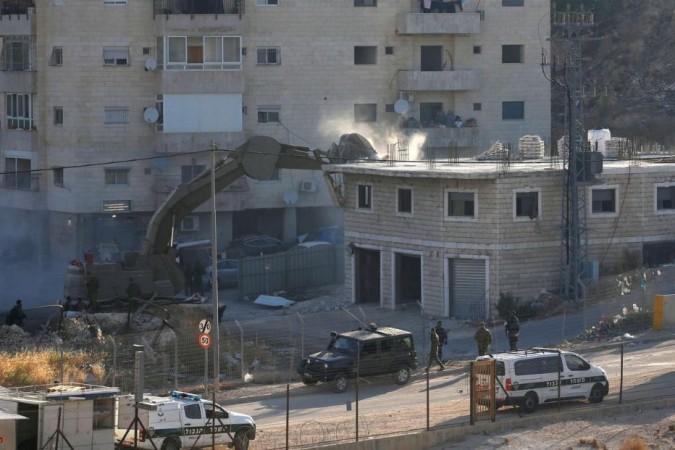
Hundreds of Israeli troops began demolishing Palestinian homes near the Israeli West Bank barrier on Monday July 22, drawing criticism and protests from international communities.
The demolishing took place in Sur Baher, a Palestinian village in the disputed Wadi al-Hummus region close to the Israeli West Bank barrier. Israel officials have considered the settlements as a threat to regional security.
The surrounding village residents of Wadi al-Hummus told local media that 16 residential buildings, including 100 apartments were bulldozed on Monday morning.
"They have been evacuating people from their homes by force and they have started planting explosives in the homes they want to destroy," Hamada Hamada, a community leader, told Reuters.
The Israeli-led demolition took place a month after the Supreme Court of Israel ruled in favour of the military in a dispute which involved violation of a construction ban. The seven-year legal fight ended in June and the residents of the community were given a deadline for eviction on July 18, Friday.
The ruling was contested by Palestinians who said that the act will propel demolitions in other towns along the separation wall which runs for hundreds of kilometres. Residents also claimed that the ruling was flawed.
"I built this house stone by stone. It was my dream to live in this house. Now I am losing everything," resident Fadi al-Wahash told Reuters.
Israeli Internal Security Minister Gilad Erdan said that the residents were "making their own law" despite orders from the military commander by building "illegal structures."
"To my regret, there is no sufficient governance there. But it is not just that there are hundreds of structures there — several dozens of them sit almost on the route of the separation fence, endangering the security forces that operate there," Erdan told Israel's Army Radio.
However, Palestinian Prime Minister Mohammad Shtayyeh said that demolitions were forced displacements and that Palestinians would complain to the International Criminal Court (ICC) regarding the matter.
"The cabinet condemns this grave aggression. This is a continuation of the forced displacement of the people of Jerusalem from their homes and lands — a war crime and a crime against humanity," Shtayyeh said.
Palestinian authorities have said that the buildings in Wadi al-Hummus region come under the Palestinian Authority and civilian control under the 1993 Oslo Accords.
The Palestine Liberation Organization issued a statement before the Israeli judgement in June that accused the Israeli government "to set a precedent to enable the Israeli occupying forces to demolish numerous Palestinian buildings located in close proximity" to the separation wall.
International protests
The United Nations humanitarian coordinator, Jamie McGoldrick, and other UN officials tried calling Israeli authorities last week to halt the plans to conduct demolition in the region.
European Union also issued a statement on the issue and said: "The continuation of this policy undermines the viability of the two-state solution and the prospect for lasting peace."
While Palestinians have claimed that the move is a state-sponsored effort to grab its territory, Israel court claimed that the buildings could provide cover for Palestinian suicide bombers and attackers due to its proximity with the West Bank barrier.
The Israeli West Bank barrier, projected to be 720km long when complete, is said to be a security barrier against terrorism. The International Court of Justice (ICJ) said that the contentious barrier on the occupied territory was "contrary to international law", according to an advisory issued in 2004.

















